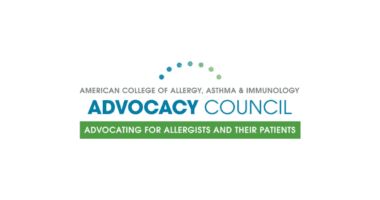As the leader in advocacy, the Advocacy Council submitted comments in response to CMS’ 2025 Proposed Medicare Physician Fee Schedule. We recommended that CMS:
- Work with Congress to mitigate or eliminate the effects of cuts to physician reimbursement and identify long-term “fixes” to this annual issue.
- Expand and permanently adopt a flexible definition of direct supervision to CPT code 95165 [Professional services for the supervision of preparation and provision of antigens for allergen immunotherapy; single or multiple antigens (specify number of doses)], so that allergists can continue to satisfy the direct supervision requirement through the use of real-time video and audio technology.
- Continue, through 2025, to permit the distant site practitioner to use their currently enrolled practice location instead of their home address when providing telehealth services from their home. We urged CMS to permanently adopt this policy after 2025.
- Continue to recognize MIPS Value Pathway (MVP) participation as voluntary for the foreseeable future. We also encourage the agency to meaningfully reform the traditional MIPS program to address the current, burdensome requirements and complexities that plague the MIPS program. We strongly support legislation that would replace elements of the MIPS program with the proposed Data-Driven Performance Payment System.
- Adopt MVP policies that will remedy the substantial administrative burdens of the current, traditional MIPS program. CMS needs to work collaboratively with stakeholders to develop a proper MVP framework that results in more clinically relevant and meaningful performance data for specialties.
- Develop a separate MVP for the practice of allergy that is meaningful to allergists in place of the current Pulmonary Care MVP that does not offer sufficient reporting options for allergists. At a minimum, the Pulmonology Care MVP should include the following additional measures:
- Quality ID #130: Documentation of Current Medications in the Medical Record.
- Quality ID #332: Adult Sinusitis: Appropriate Choice of Antibiotic: Amoxicillin With or Without Clavulanate Prescribed for Patients with Acute Bacterial Sinusitis (Appropriate Use).
- Quality ID # 331 Adult Sinusitis: Antibiotic Prescribed for Acute Viral Sinusitis (Overuse).
In addition, we expressed our support of CMS’ decision to add the following quality measure to the Allergy/Immunology specialty set:
- Adult COVID-19 Vaccination Status: Percentage of patients aged 18 years and older seen for a visit during the performance period that are up to date on their COVID-19 vaccinations as defined by CDC recommendations on current vaccination.
We also applauded CMS’ decisions to:
- Not increase the data completeness threshold through the 2028 performance year.
- Not increase the performance threshold for the 2025 performance period.
And, we supported CMS’:
- Proposal to permanently adopt a flexible definition of direct supervision with respect to CPT codes 95012 [exhaled nitric oxide meas], 95044 [allergy patch tests], 95052 [photo patch test], 95056 [photosensitivity tests], 95115 [immunotherapy one injection], and 95117 [immunotherapy injections].
- Proposed reweighting policy to ensure that clinicians are not unfairly penalized due to third party intermediary actions outside of the clinician’s control.
- Proposal to modify the methodology for scoring cost measures beginning with the 2024 performance period, as it would likely have a positive impact on allergists’ MIPS scores beginning in 2024.
- Proposal that clinicians, groups, and subgroups reporting via MVPs attest to one activity, regardless of special status.
- Proposal to calculate a score for each promoting interoperability (PI) data submission and use the highest score received as the PI score. ACAAI and the Advocacy Council support this policy as a reasonable approach to scoring that does not unduly disadvantage clinicians.
- Proposal that the quality performance category include numerator and denominator information for at least one quality measure; include a “yes” response to at least one improvement activity (IA); performance data – including any claim of an applicable exclusion – for the measures in each objective; required attestation statements; CMS CEHRT ID from the Certified Health IT Product List; and the start and end date for the applicable performance period.
Finally, ACAAI and the Advocacy Council urged CMS to collaborate with specialty societies to develop more appropriate, specialty-focused payment models and refine the MVP program before moving forward with new payment models.
We will provide an update when CMS finalizes its 2025 Medicare Physician Fee Schedule in early November.
The Advocacy Council – ADVOCATING FOR ALLERGISTS AND THEIR PATIENTS.


